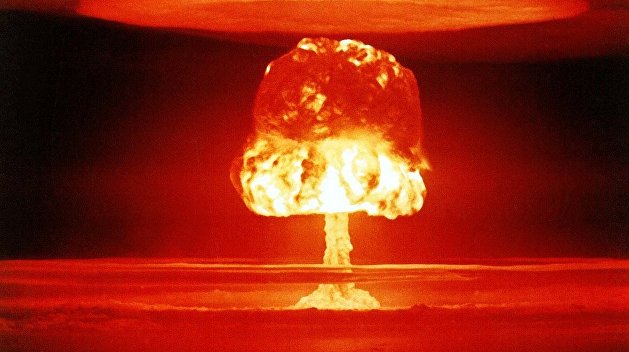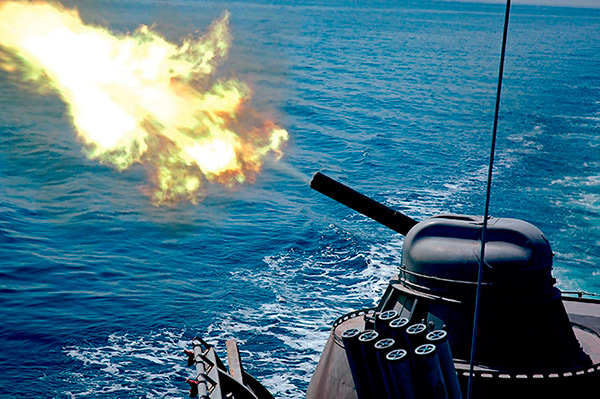
Modern wars do not start because of, someone who had hurt himself or looked after extra piece zemlitsy. War – too expensive lesson, to unleash its abstract considerations
At the heart of any modern military conflict lie the economic interests. properly, it was before, but the medieval economy was as dynastic (family), as it is the medieval policy. Therefore, before the beginning of the Renaissance War skillfully disguised as conflicts on the honor or rights of inheritance. Then, masking has been abandoned. But there is reason for the outbreak of hostilities is still not crept utilitarian.
for example, World War I, which could begin and a couple of years earlier, and a couple of years later, but who is ready and who is willing to whole Europe, formally began after the murder of Serbian terrorist Gavrilo Princip in Sarajevo, the Bosnian heir to the Austro-Hungarian throne, Archduke Franz Ferdinand. In fact, it started because, that rapidly developing Germany lacked colonies, dismantled Britain and France. In its turn, Great Britain feared the German fleet building program. The Germans promptly set up the second power (after the British) peace and is ready to make his first fleet. This would strengthen Germany's position in the debate about the colonies, London and wanted to destroy the enemy before, what Berlin really could compete with it on the seas.
Wherein, as rightly said in the "Guns of August" Barbara W. Tuchman, "War nobody wanted", but "the war was inevitable". Really, all preferred to negotiate, but were too sharp contradiction, too diametrically positions, to find a compromise solution. But the economy was necessary certainty and, again failed to agree, I had to fight - there was no other way out (except that someone had to give up and accept the role of second-class state).
It should also be borne in mind, that if the state decide to fight, they are trying to force the opponent to go to war in unfavorable conditions. for example, German General Staff, on the eve of the First World War, was sure, that if the UK does not act, then France and Germany Russia in turn will defeat the. As experience has shown, this confidence was based on the right calculation. Even in conditions of transfer of the two buildings on the Eastern Front and the brought Moltke changes in the Schlieffen Plan (which weakened the wing attack), without the British Expeditionary Force Battle of the Marne would have been played by the French, which led to the defeat of France (and behind it, and Russia) in the war. That's not counting the British Navy, paralyzed deliveries to Germany is not only of strategic raw materials, but also food.
Germany feelers regarding the intentions of the British and it was given to understand, that London would not enter the war. Britain did not declared war on Germany nor 1 August, when Berlin declared war on Russia, us 3 August, when Germany declared war on France. But on August 4 th, picking upon a violation of the neutrality of Belgium, Britain entered the war, Germany and it was too late to retreat.
Similarly, the US provoked a 1941 year military conflict Japan. They just placed an embargo on the supply of oil to this country. Without oil, the Japanese army and navy proved unfit for action, and the industry could not work. Japan had to either accept US dominance in the Pacific waters, or to break through to the oil sources in Indonesia and to cover up the delivery of oil to the Japanese islands. For this purpose it was necessary to destroy the American fleet in the Pacific Ocean and take a base on the islands, making the territory of Japan, sources of raw materials and important for the country's sea lanes beyond the reach of US air. Japan tried to negotiate, but the US is not going to compromise and Tokyo had to choose war.
Typically, large-scale military clashes, great world, It falls to the changing global economic systems. The danger of the First World War began to grow at a breakneck pace since the end of the XIX century, when just a couple of decades, the world was divided between several colonial empires. That is standard, capitalism was replaced by a system of colonial imperialism. The Second World War also had to be scrapped ages. In place of the decrepit British colonial imperialism, went the American neo-colonialism, in which the state operated, not controlled by the military and political, and financial cost, and the system of "concert" of several great powers has been replaced by a single hegemonic system (within the framework of the capitalist world).
Now we are at the turn of epochs. Thing of the past with the American neocolonialism and hegemonic system of owned hegemon, does not provide a single world currency. In the world there are several centers of power, as a military-political, and financial and economic. The military-political and financial-economic power do not always coincide in the same state (often do not match). This makes inevitable a complex system of alliances, declared, as economic, but having a strong (though not formalized de jure) military component. At the same time continue to function unions (economic and military) took shape in a single hegemonic system. The result is a growing cognitive dissonance, when the actual economic interests demand from a number of states to enter into new alliances, and the old ones keep their commitments under the previous system, prejudicial to their development.
Besides, Unlike previous shifts global economic system, currently, in each of the participating countries in the global confrontation (regardless of, which camp it belongs) fighting two powerful elite groups, one of which is tightly associated with the old system and intends, if not save it, that prolong the agony (on the principle "in our century will suffice"), and the other opted for early demolition of the old system and a jump into the unknown future. It antitrampisty and trampisty in the US, left-liberal globalists and right-conservative traditionalists in Europe, russophobes Russophile and the post-Soviet and post-socialist space, pro-Western liberals allied with the right-left-wing radicals and patriots statesmen in Russia, Contingent Hong Kong and Taiwan against the CCP in China.
In different countries, they identify different, can be fascists, Communists, monarchists, burzhuaznыmy Democrats, They can be painted in any political colors and shades, but in fact they belong to one or the other camp is determined by their attitude to the decaying system of American hegemony. they, who associate their wellbeing with the preservation of this system is pushing the world to a confrontation, because otherwise, as the threat of war, this system can not be saved. It weakens and crumbles due to objective reasons. Just because, that in connection with the exhaustion of free markets is exhausted and the potential for its development, a feature of the system is the need for constant faster growth. If there is no growth, system, How to lose the motorcycle speed, becomes unstable and falls. That is why Putin He spoke of the exhaustion of the liberal idea, a Makron - the exhaustion of modern capitalism. Under the current system development capabilities really exhausted.
At this stage, for the supporters of the US hegemony system is extremely important to avoid the creation of a relevant and highly beneficial to all participants of the economic (and in the short term and the political) trans-Eurasian union, the backbone of which is the axis of the Brussels-Moscow-Beijing. However, because the EU decision-making bodies is still very strong position of the left-liberal globalists, instead Brussels scheme may be Paris and Berlin. Again, Putin and Macron lately very often talk about the need to create a common economic space from Lisbon to Vladivostok (or to Shanghai), as the backbone of the new system, able to set a new global economy sustainable development.
The greatest danger globalists see the establishment of Russian-European relations. Moscow has already established close military-political and economic relations with China. For Europe, Russia is not only a supplier of raw materials (and in some cases very tech products), but also a bridge to Asia. Besides, Russia could easily replace the US as the guarantor of the security of the EU. It means, that a strong Russian economic partnership with the EU is not even all, but at least to begin with Germany or France finally buries the old system. Hegemon loses control of the whole of Eurasia, Atlantic unity crumbles, and a new Russian-Chinese-European Union establishes the financial and economic control not only over Eurasia, but over Africa and even Latin America. It is not known whether the US will harness even such close allies, as Mexico, Canada and the UK.
To prevent such a development, globalists provoke conflict between Russia and the EU. We used to talk, that the conflict provoked Americans. This is partly because, but it is not quite right. If it were some Americans, the problem would have been solved long ago. But the problem is, that our enemies is not only the most influential (controlling the Senate and the House of Representatives "bipartisan majority", as well as the owners of most of the media resources) part of the US elite, but the majority of European bureaucracy and national politicians in the EU.
That is why we regularly come across situations, when our common EU energy projects ("South Stream", "Northern streams 1 and 2") carefully decelerated and even disavow the last moment it is the Europeans. Furthermore, we are faced with a totally unjust, even absurd decisions of European courts. Same Stockholm arbitration motivated its decision to award the "Gazprom" penalty on a "pump or pay" (which was not in the contract with "Naftogaz" of Ukraine) the, that Kiev needs money.
This subversive work of the Euro-American left-liberal globalist elites directed both against us, так и против своих собственных внутриполитических оппонентов. Она ориентирована не столько на срыв проектов (срыв — программа максимум), сколько подрыв юридических основ сотрудничества. Unjust decisions and disclaimers at the last moment (when money has already been invested) Russia must make or refuse recognition of the European System of Justice, либо платить десятки, а то и сотни миллиардов долларов на содержание своих врагов, поскольку так «Европа присудила». clear, что никакого «Газпрома» вместе с «Роснефтью» не хватит, чтобы удовлетворить все европейские аппетиты (одна Украина, хоть и не член ЕС, размахивается на пару десятков миллиардов). Значит сотрудничество надо разрывать, как невыгодное (что и требуется глобалистам). Если же Россия будет упорствовать и, let's, откажется платить, можно начать массово арестовывать её имущество (ведь есть же судебное решение). Зеркальный ответ России приведёт к росту напряжённости и, ultimately, разрыву отношений с ЕС (что и требуется глобалистам).
Именно поэтому я не разделяю оптимизма экспертов по поводу абсурдного требования нового главы «Нафтогаза» Юрия Витренко (требование, by the way, старое), либо заключить контракт на транзит на украинских условиях, либо выплатить штраф («за предыдущие низкие тарифы») размером в 11-14 billions of dollars. Если Стокгольмский арбитраж присудил «Газпрому» почти пятимиллиардный штраф за отсутствующее в контракте положение «качай или плати», то почему он не может присудить ещё 14 billions. Ведь за это время нужда Украины в деньгах не уменьшилась.
they say, что в любом случае взыскать деньги с «Газпрома» не удастся. А это и не надо. Ukraine, can, и рассчитывает на какую-то копеечку, но организаторам этих «судебных решений» нужны не деньги (хоть и они не помешают) а создание юридических препятствий сотрудничеству России и ЕС. Даже самые антиглобалистские европейские элиты пока не могут согласиться с тем, that someone (пусть и целая Россия) не будет выполнять судебные решения (до сих пор такое себе могли позволить только США). То есть Москва оказывается в вилке — либо платить сколько скажут, а тогда будут требовать всё больше и больше, либо отказываться от выполнения решений и тогда Россию обвинят в том, что она ненадёжный партнёр, не уважает суды т.д.
Причём надо понимать, что удар направлен и против сторонников сотрудничества с Россией в самих европейских странах. Их тоже хотят поставить в ситуацию, когда всё понимая, они ничего не смогут сказать в защиту собственных политических концепций, ибо это будет противоречить европейской политической традиции.
by the way, наступление на газовые сделки с Европой развернуто комплексное. Буквально накануне заявления Витренко, суд ЕС принял решение, которым опять ограничил использование «Газпромом» газопровода ОРАL. Can, of course, to tell, что когда зимой станет холодно, а газа будет недоставать они это решение пересмотрят. But, At first, могут и не пересмотреть (выкрутятся за счёт сжиженного или зима окажется тёплой), and secondly, даже если пересмотрят, то нормально работать в условиях, когда один и тот же суд, раз-два в год меняет правила игры на противоположные (а ЕС принимает дискриминационные меры задним числом, что недопустимо по правилам ВТО) ни одна нормальная компания не сможет.
Нам создают такие же условия экономического сотрудничества с ЕС, how they, что были у мореплавателей до тех пор, пока в XVII-XVIII веках не начало оформляться международное морское право. Until, любой корабль мог быть захвачен более сильным встречным судном. Даже Колумб, отплывая на поиск пути в Индию, на испанских кораблях, держал время отплытия и маршрут в тайне, ибо опасался, что будет атакован португальцами, ревностно оберегавшими монополию на индийскую торговлю. Нас толкают к пиратским правилам международной торговли и экономического сотрудничества, вернее к игре без правил, чтобы нас же в этом и обвинить, обеспечив разрыв торгово-экономического партнёрства с Европой.
Альтернативой пиратскому беспределу всегда была сила. Но сила означает конфликт, а конфликт такого масштаба легко может перерасти не просто в военное столкновение, но в полномасштабную ядерную войну. Не случайно об опасности таковой предупреждали и президент России, and defense minister, и Министерство иностранных дел. Наши противники считают, что мы не рискнём пойти на обострение. Ведь в таком случае всё равно партнёрство будет свёрнуто, ещё и военная опасность вырастит на порядки. Но они не просчитывают ситуацию на случай, если Москва вызов примет и на конфликт пойдёт (Осетия и Крым никого ничему не научили). И это опасно, поскольку когда решения такого уровня принимаются “за доской”, без адекватного анализа и оценки рисков, перейти роковую грань очень легко. Especially, что они сами пытаются поставить Россию перед выбором между плохим и худшим (капитуляция либо конфронтация).
В аналогичный тупик Россию пытались загнать в 2008 году в Грузии и в 2014 году на Украине. Оба раза Путин нашёл неочевидный третий выход. Но оба раза, making a decision, он рисковал, because the West did not back down, and then it would be necessary to take the next step. A step up to the beginning of the military crisis should be not so much (three to five, hardly more). maybe, третий выход будет найден и сейчас. Finally, слабость наших оппонентов в их силе. Сила заключается в том, что мы не можем просчитать действия США и европейских государств с той же точностью, что в 90-е или нулевые. Тогда их элиты были едины и алгоритм их действий в критической ситуации был понятен. Сейчас же в каждой стране идёт борьба элит. Причём они знают, что такая же борьба идёт у нас. И хоть российские прозападные оппозиционеры слабы и не пользуются поддержкой народа, но в плане финансово-экономическом и медийном они достаточно влиятельны, у них есть серьёзные аргументы в защиту своей капитулянтской позиции.
In this way, и мы не можем точно предсказать, позиция какой элитной группы в какой западной стране в отдельно взятый момент времени возобладает, и они не могут точно оценить реальные возможности влияния на позицию Кремля прозападной части российской элиты. I repeat, в краткосрочном плане аргументы “западников” выглядят достаточно убедительно. Another thing, что уже в среднесрочной перспективе (не говоря о долгосрочной оценке) it is seen, что они не решают ни одной из проблем и никак не уменьшают риск, а лишь переносят его на пару лет ценой общего ослабления России.
Всё как обычно. Никто не хочет воевать. Все хотят мира, благополучия, процветания. Но в эпоху смены систем процветание одних элитных групп ведёт к упадку других (and vice versa). Поэтому противоречия становятся непримиримы, оппоненты начинают восприниматься уже не как политические партнёры, имеющие иные взгляды, но как злобные иррациональные разрушители цивилизации. Внутренний кризис накладывается на внешний, за счёт чего международное противостояние приобретает характерные черты гражданского конфликта. Гражданские же войны самые жестокие, поскольку противники в них рассматриваются как абсолютное зло, с которым невозможно жить в одном государстве. Его надо либо выдавить за пределы, либо уничтожить. В нашем случае, имея дело с глобальным системным кризисом, противостоящие группы никуда не могут выдавить оппонентов, ведь ареной противостояния стала вся планета. A war of extermination supporters of the wrong system carries the risk of the destruction of all mankind. Needed third output.
Rostislav Ishchenko











